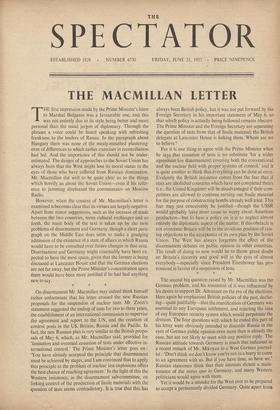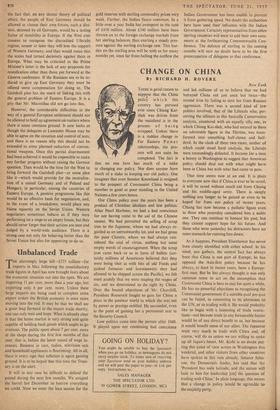THE MACMILLAN LETTER
THE first impression made by the Prime Minister's letter to Marshal Bulganin was a favourable one, and this was not entirely due to its style being better and more personal than the usual jargon of diplomacy. Through the phrases a voice could be heard speaking with refreshing frankness to the leaders of Russia. In the paragraph about Hungary there was none of the mealy-mouthed plastering- over of differences to which earlier exercises in reconciliation had led. And the importance of this should not be under- estimated. The danger of approaches to the Soviet Union has always been that the West might lose its moral status in the eyes of those who have suffered from Russian domination. Mr. Macmillan did well to be quite clear as to the things which horrify us about the Soviet Union—even if his refer- ence to jamming displeased the commentator on Moscow Radio.
However, when the content of Mr. Macmillan's letter is examined it becomes clear that its virtues are largely negative. Apart from minor suggestions, such as the increase of trade between the two countries, more cultural exchanges and so forth, the main body of the text is taken up by. the twin problems of disarmament and Germany, though a short para- graph on the Middle East does seem to make a grudging admission of the existence of a state of affairs in which Russia would have to be consulted over future changes in that area. Disarmament and 'Germany might reasonably have been ex- pected to have the most space, given that the former is being discussed at Lancaster House and that the German elections are not far away, but the Prime Minister's concentration upon them would have been more justified if he had had anything new to say.
* * * On disarmament Mr. Macmillan may indeed think himself rather unfortunate that his letter crossed the new Russian proposals for the suspension of nuclear tests. Mr. Zorin's statement suggested the ending of tests for two to three years, the establishment of an international commission to supervise the agreement and report to the UN, and the creation of control posts in the US, Britain, Russia and the Pacific. In fact, the new Russian plan is very similar to the British propo- sals of May 6, which, as Mr. Macmillan said, provided for 'limitation and eventual cessation of tests under effective in- ternational control.' The Prime Minister's letter goes on : 'You have already accepted the principle that disarmament must be achieved by stages, and I am convinced that to apply this principle to the problem of nuclear test explosions offers the best chance of reaching agreement.' In the light of this the Western insistence, in the disarmament sub-committee, on linking control of the production of fissile materials with the question of tests seems contradictory. It is true that this has always been British policy, but it was not put forward by the Foreign Secretary in his important statement of May 6, so that which policy is actually being followed remains obscure The Prime Minister and the Foreign Secretary are separating the question of tests from that of fissile-material; the British delegate at Lancaster House is linking them. Whom are we to believe?
For it is one thing to agree with the Prime Minister when he says that cessation of tests is no substitute 'for a wider agreement [on disarmament] covering both the conventional and the nuclear field with proper systems of control,' and it is quite another to think that everything can be done at once. Evidently the British insistence comes from the fear that if tests are abolished countries which have not completed theirs (i.e., the United Kingdom) will be disadvantaged if their com- petitors are allowed to continue turning out fissile material for the purpose of constructing bombs already well tried. This fear may just conceivably be justified—though the USSR would probably have more cause to worry about American production—but to base a 'policy on it is to neglect almost entirely the diplomatic aspect of the matter. If this obstacle is not overcome Britain will be in the invidious position of rais- ing objections to the acceptance of its own plan by the Soviet Union. The West has always forgotten the effect of the disarmament debates on public opinion in other countries. The result of doing so now would be to throw grave doubt on Britain's sincerity and good will in the eyes of almost everybody—especially since President Eisenhower has pro- nounced in favour of a suspension of tests.
The second big question raised by Mr. Macmillan was the German problem, and his treatment of it was influenced by his desire to support Dr. Adenauer on the eve of the elections. Here again he emphasised British policies of the past, declar- ing—quite justifiably—that the reunification of Germany was essential to any European settlement, and rejecting the idea of any European security system which would perpetuate the division. The four questions with which he ended this part of his letter were obviously intended to discredit Russia in the eyes of German publie opinion even more than is already the case, but are not likely to meet with any positive reply. The Russian attitude towards Germany is much that indicated in a recent remark of Mr. Mikoyan to a West German journal- ist : 'Don't think we don't know you're not in a hurry to come to an agreement with us. But if you have time, so have we.' Russian statesmen think that their interests dictate a main- tenance of the status quo in Germany, and many Western politicians would agree with them.
Yet it would be a mistake for the West ever to be prepared to accept a permanently divided Germany. Quite apart from
the fact that, on any decent theory of political ethics, the people of East Germany should be allowed to choose their own future, such a divi- sion, detested by all Germans, would be a lasting factor of instability in Europe. If the West ever consent to recognise the discredited Ulbricht regime, sooner or later they will lose the support of Western Germany, and that would mean that the scales had turned decisively against them in Europe. What may be criticised in the Prime Minister's letter is the lack of any proposals for reunification other than those put forward at the Geneva conference. If the Russians are to be in- duced to give up East Germany they must be offered some compensation for doing so. The Gaitskell plan has the merit of linking this with the general problem of Eastern Europe. It is a pity that Mr. Macmillan did not go into this..
However, the considerable difficulties in the way of a general European settlement should not be allowed to hold up agreement on matters where there is some common ground. It now looks as though the delegates at Lancaster House may be able to agree on the cessation and control of tests, and there is no reason why this should not be extended to some planned reduction of conven- tional weapons. Once this partial disarmament had been achieved it would be impossible to make any further progress without raising the German question. Then would be the time for the West to bring forward the Gaitskell plan—or some plan like it—which would provide for the neutralisa- tion of a united Germany and of Poland and Hungary, in particular, among the countries of Eastern Europe. A positive programme like this would be an effective basis for negotiation, and, in the event of a breakdown, would place any blame squarely on the Soviet Union. Western negotiators sometimes behave as if they were performing on a stage to an empty house, but they should never forget that their actions are seen and judged by a world-wide audience. There is a strong case not only for behaving better than the Soviet Union but also for appearing to do so.



































 Previous page
Previous page